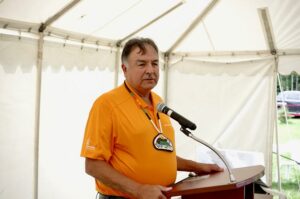Fort William First Nation Chief offers words of compassion and care during Unity Gathering

By Rick Garrick
FORT WILLIAM FIRST NATION — Substance abuse issues were highlighted during the Leadership Statement on Substance Use at the 5th Annual Nokiiwin Tribal Council Unity Gathering, held Aug. 15-19 on Anemki Wajiw.
“I want to acknowledge the individuals here at this gathering that have a lived experience of going through the hardship, the hurt, the trauma of substance abuse – that opioid addiction and how challenging it is to get out of that,” says Audrey Gilbeau, executive director at Nokiiwin Tribal Council. “This gathering here is about that, it’s about developing a call of action that we can take together collectively to support each other individually, to support families and to support communities.”
Mercedes Hardy, a Biinjitiwaabik Zaaging Anishinaabek (BZA) citizen, shared her story of quitting drug and alcohol use during the Leadership Statement on Substance Use.
“I’m proud to say I’ve been sober from drug use for nearly eight years and from alcohol for two,” Hardy says. “No matter how long I stay sober, people in my community still seem to see me as an addict. A little while ago, I had someone borrow carrots off me and then the next day I heard a rumour I was doing drugs, and it hurts because I have come so far from where I was and I’m really proud of myself. Why can’t I help my friends without being judged?”
Hardy says alcohol use is not seen as an issue in the same way that drug use is.
“It seems normalized, glorified even,” Hardy says. “But for me, drinking was a lot harder to quit than it was [for] drugs because it’s everywhere. People are being judged for having an illness and it makes them afraid to ask for help because they’re going to be judged.”
Hardy says another issue is access to treatment services, noting that she had to travel every day for eight weeks to Nipigon for the treatment she needed.
“I suggested to the clinic in Nipigon that more people from my community would go on programs if it was available to them,” Hardy says. “Shortly after that, the worker contacted [BZA] and they now have a van for Suboxone people, and so much people have changed their lives around since then.”
Fort William Chief Peter Collins says it is important to send a message to Hardy and other people dealing with drug or alcohol issues that “our passion, our love for you will never waver.”
“That passion and that love and that respect for you will always be there even though some people in our communities look at you in a different light,” Collins says. “Our communities still love you and still respect you for the work and your commitment in trying to change other’s lives, it’s so important.”
Collins says he has been dealing with addiction issues since he was elected in 1998, as a chief and as a father.
“We must work together to bring in solutions, land-based solutions,” Collins says. “We talk about the massive land base that we do have in each one of our backyards — waterways and land mass. Those are the opportunities that are going to help heal our people.”
Netmizaaggamig Nishnaabeg Deputy Chief Thurston Kwissiwa says one of the main causes of drug and alcohol abuse is the intergenerational trauma First Nations people experienced.
“My grandmother was in Residential School, my father was in training school and I was in Day School,” Kwissiwa says. “I was one of the lucky ones not to ever touch alcohol and drugs — I don’t know how I did it but yet today I suffer from it.”
The Unity Gathering also featured a variety of teachings and activities, including a pow wow on Aug. 17.

